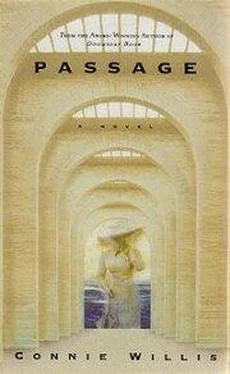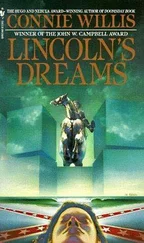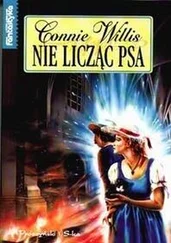She was clinging to the deck railing, her body half over the side. She had let go of the bulldog again, and it scrabbled at her legs, whimpering, sliding away from her down the steep deck.
She caught it up against her chest and groped her way toward the support in the middle of the deck, hanging on to the railing as long as she could and then letting go and half-sliding, half-falling toward the safety of the wooden pillar. The deck lights dimmed down to nothing and came on again, dull red.
“The visual cortex is shutting down,” Joanna said, and lurched for the pillar. She wrapped the leash around her wrist, struggling to bind them to the pillar without letting go of the leash. A crash cart slid past them, picking up speed. A tiger, its striped fur red and black in the dimming light, loped by.
Joanna passed the leash around her waist, the dog, the pillar, and tied it in a knot. “This way I won’t let go of you. Like ‘The Wreck of the Hesperus,’ ” she said and wished Mr. Briarley were here. “ ‘He cut a rope from a broken spar, and bound her to the mast,’ ” she recited, but when she said the next line, it didn’t come out right. “ ‘And when they were dead,’ ” she recited, “ ‘the robins so red, gathered strawberry leaves and over them spread.’ ”
The ship was beginning to overbalance, like Ricky Inman going over in his chair. The bulldog, between her chest and the pillar, looked up at her with wild, frightened eyes. “Don’t be afraid,” she whispered. “It can’t last much longer.”
Snow began to fall, large gray-white flakes drifting down onto the deck like apple blossoms, like ash. Joanna looked up, half-expecting to see Vesuvius above them. A sailor, all in white, ran past, dragging landing chocks behind him, shouting, “Zeroes at oh-nine hundred!” The band stopped, paused, began to play.
“This is it,” Joanna whispered, “ ‘Nearer, My God, to Thee.’ ” But that wasn’t the tune. “Well, at least some good has come out of this,” she said to the dog, trying to smile. “We’ve solved the mystery of whether they were playing ‘Nearer, My God, to Thee,’ or ‘Autumn.’ ” But it wasn’t “Autumn” either. It wasn’t a hymn at all. It was “The Stars and Stripes Forever.”
“Oh, Maisie,” she murmured.
An Apache galloped past, brandishing a knife. Water began to pour from the lifeboat davits, from the railings, from the chest. “This is the worst of the worst catastrophes in the world!” a reporter on the roof of the officers’ quarters sobbed into a microphone. “It’s a terrific crash, ladies and gentlemen, the smoke and the flames now! Oh, the humanity!” The code alarm began to scream.
Joanna looked up. The stern of the ship reared above her, suspended against the blackness. She hugged the dog against her and tried to shield its head. The lights went out, blinked on dull red, went off, came on again. Like Morse code. Like Lavoisier.
There was a horrible rending sound, and everything began to fall, deck chairs and the grand piano and the giant funnels, violins and Indian clubs and playing cards, postcards and pomegranates and dishes and Dish Night, transcripts and trellises and telegrams. Books toppled out of their shelves, Mirrors and Mazes and The Titanic ABC and The Light at the End of the Tunnel. The davits broke loose from their moorings, and the mechanical camel, and the weight machine, looking more than ever like a guillotine. The stanchions fell, and the engine room telegraph, set now on Stop, and scans and sleep masks and shortcuts, arteries, ancient mariners, minirecorders, metaphors, dog tags, heating vents, knives, neurons, night.
They crashed down on Joanna and the little bulldog with a rending, deafening roar, and in the last moment before it reached them, she realized she had been wrong about the noise she had heard when she came through. It was not the sound of the engines stopping or of the code alarm buzzing, of the iceberg slashing into the ship’s side, but the sound of her whole life crashing, crashing, crashing down on her.
“Standby.”
—Wireless message from the
Frankfurt to the
Titanic
“I’ve been trying to call you since Wednesday,” Maisie said disgustedly to Richard. She reached for her remote and turned down the sound on The Sound of Music. “But they don’t let you have phones in your room in here, you have to tell the sector nurse and she makes the call for you, she dials it and everything, and they don’t allow cell phones either ’cause of people’s pacemakers, you might scramble their signals and they’d go into V-fib or something,” she said, a little like a runaway train herself, “so I asked Nurse Lucille to call you, and she said, ‘What for?’ and I couldn’t say the real reason ’cause I’m not supposed to know about Joanna. We need to have a code for next time.”
“All right, we’ll work one out,” Richard said. “You found out who Joanna had been to see?”
“Yes. So, anyway, I told her to tell you I needed to see you, and I said you weren’t a visitor, you were a doctor, but she still wouldn’t call you.”
She paused to get her breath, wheezing a little, and then started up again. “So I asked her to call Ms. Sutterly to bring me my books, because she’s not a visitor, I have to have my books so I can do my homework. I thought when she came I could secretly hand her this note with your phone number on it, but Nurse Lucille said ‘Family members only.’ It’s like a prison.”
“So you told your mother I’d discovered a cure for coding?” Richard said.
She nodded. “I got the idea watching The Parent Trap, the part where they fool the mom. I couldn’t think of anything else,” she said defensively. “I figured she’d make you come see me if she thought you’d figured out a way to bring people back after they coded. And she did.” She sobered. “I know you don’t really know how to do that. Are you mad?”
“No. I should have come to see you earlier when you didn’t call. I came a couple of days ago, but you were out having tests.”
She nodded. “An echocardiogram. Again. I tried the whole time I was down there to get somebody to page you, but nobody would. They said pages were for hospital business only.”
“But you got the message to me,” Richard said. “That’s the important thing. And you found out where Joanna was and who she talked to.”
She nodded emphatically. “That was even harder than getting the message to you ’cause I couldn’t go anywhere or call anybody, and I knew if I asked the nurses, they’d ask me what I wanted to know for, so I asked Eugene. He’s the guy who brings the menu things. When I was down in Peds, Eugene brought the menu things down there, too, so I figured he did all the floors and saw lots of people.”
“And he saw Joanna?” Richard said, trying to get Maisie to the point.
“No,” Maisie said. “I had to talk really hard to get Eugene to ask them if they saw Joanna. He didn’t want to. He said patients were always trying to get him to do stuff he wasn’t supposed to, like extra cookies on their tray and sneak in pizza and stuff, and he could lose his job if he did it, and I told him I wasn’t asking him to bring me anything, just ask some questions, and I was really sick, I had to have a heart transplant and everything, and if he wouldn’t do it, I’d have to ask them myself, and I’d probably code.”
Maisie Machiavelli. “So he said he’d ask them.”
“Yes, and one of the tray people saw her in the west wing, going up the stairs to the fifth floor really in a hurry.”
The fifth floor. What was on five?
Читать дальше












